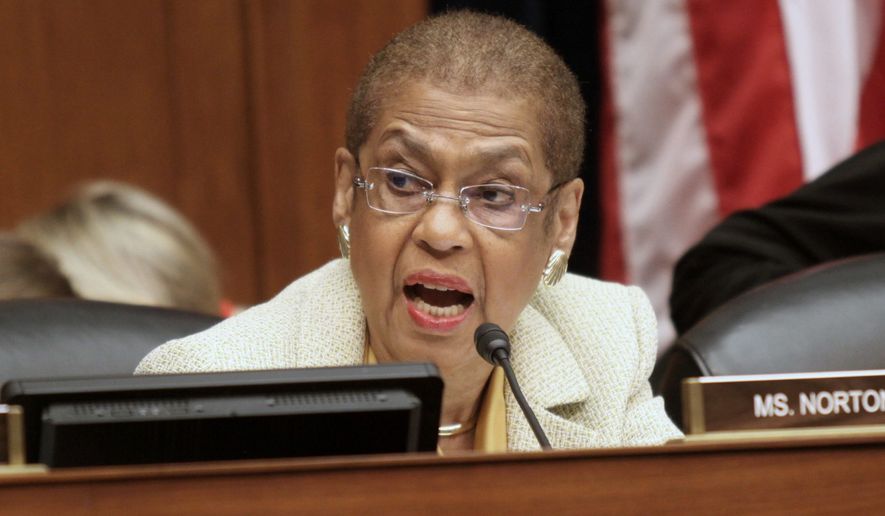District activists and local officials insist they can feel new energy surging through the D.C. statehood movement — even in the face of a vote by a House committee Monday night to strike down a high-profile city law passed less than two months ago.
Hundreds of District residents packed a Northeast theater to protest the congressional drive to strike down the assisted suicide law signed in December that would allow some terminally ill adults to end their lives.
“Welcome to the resistance,” Council member Charles Allen, who organized the town hall event, said Monday night to a filled auditorium at the Atlas Performing Arts Center on H Street Northeast.
The gathering was sparked by a push spearheaded by House Oversight and Government Reform Committee Chairman Jason Chaffetz, Utah Republican, to overturn the law. But for those in attendance, the bigger prize now was the need for D.C. statehood and to limit congressional oversight of the city.
“The big thing about last night is that we’re starting to get the citizenry not just interested in statehood, but also active in it,” Josh Burch, a longtime statehood activist told The Washington Times Tuesday. “It can’t be the same small group of statehood activists all the time.”
Mr. Burch, who co-founded the group Neighbors United for DC Statehood, said over the last five years his meetings have usually seen about a dozen residents interested in taking action for statehood. But last week’s organizing meeting attracted about 60 people.
The office of Mayor Muriel Bowser said she hopes the actions of Congress on Monday night will spur more residents to take a stand.
“Mayor Bowser has been clear that she will stand firm for these values, but we certainly need the continued support of residents in standing up and speaking out against these actions that undermine our right to govern ourselves,” Kevin Harris, a Bowser spokesman, said Tuesday. “Last night’s events show that more and more residents are ready to join the cause, as they have done before when they overwhelmingly voted in support of D.C. statehood.”
On Monday night Mr. Chaffetz’s committee voted 22-14 to overturn the District’s assisted suicide law. The full House and Senate, both controlled by Republicans, would need to act to fully nullify the measure.
During the markup of the disapproval resolution, District residents assembled outside the Rayburn House Office Building and lined the halls leading to the committee hearing room. Signs with the “hands off D.C.” tag dotted the crowds.
As the committee hearing wore on, those protesters moved in droves to the H Street Northeast corridor where Mr. Allen, Ward 6 Democrat, and other city officials organized workshops to teach residents how to make their local voices heard.
An estimated 500 to 600 residents filled two theaters, and a number of residents spilled into the H Street Country Club and the Star & Shamrock bars near the performing arts center.
Some residents said they were emboldened by the large crowd and the growing interest in statehood — or at least some kind of real congressional representation — for the District.
“There’s a lot more potential for recourse with a large group like this,” said Naomi Tyre, a Ward 4 resident who attended the town hall.
John Harding, a Ward 6 resident, said the House committee’s move to strike down a local D.C. law was “the antithesis of democracy.”
When asked if Mr. Allen had any comment on the House committee vote, an aide said the large crowds spilling out of the theater were message enough.
“We hope that the packed theaters tonight was the statement that we needed to send to Congress,” Allen spokesman Andy Le said.
Delegate Eleanor Holmes Norton, a Democrat and the District’s nonvoting representative in Congress, said Congress abused its power to overturn a city law.
“District officials and residents particularly resent the singling out of the District for unique treatment, while 24 House Republicans are from the six states where medical aid in dying is legal,” Ms. Norton said.
One thing working in the city’s favor is the calendar: After a D.C. law is signed by the mayor, Congress only has a 30-day window in which to repeal the measure, giving the full House, Senate and President Trump only until Friday to force the repeal. The tack taken by Mr. Chaffetz is an uncommon one. Only three disapproval resolutions have passed since D.C. home rule was instituted in 1973.
Congress has several ways to affect D.C. laws, but traditionally the method has been to withhold funds for certain programs. Under the Home Rule Act, the District can draw up and approve its own budget, but it also must be approved by Congress in the federal appropriations bill.
The law in question — deemed the Death With Dignity Act — passed the D.C. Council last year by a supermajority and was signed by Miss Bowser in December. The legislation would allow doctors the ability to prescribe life-ending medication to terminally ill patients with a prognosis of six months or less to live.
Six states — California, Colorado, Montana, Washington, Vermont and Oregon — have similar laws on the books.
• Ryan M. McDermott can be reached at rmcdermott@washingtontimes.com.




Please read our comment policy before commenting.